The Protea 2000 emissions monitoring system is approved for the analysis of exhaust gases from the engines and boilers of ships and offshore rigs. Robust and with proven reliability, up to six gases can be measured including SO2, CO2 and NOx.
The Protea 2000 emissions monitoring system comprises up to 8 exhaust mounted analysers, each with automatic verification facilities. Emissions data from the entire system is securely managed and displayed at a dedicated Classification Society approved panel PC, with outputs to networks, control systems, and reporting facilities.
 The advanced Protea 2000 analyser utilises an in-situ (inside the exhaust) sample cell so avoiding the need to extract gas. Importantly this avoids the use of costly, high maintenance sample handling systems, and enables analysis of an unmodified, truly representative gas sample.
The advanced Protea 2000 analyser utilises an in-situ (inside the exhaust) sample cell so avoiding the need to extract gas. Importantly this avoids the use of costly, high maintenance sample handling systems, and enables analysis of an unmodified, truly representative gas sample.
Exhaust gases from the combustion of residual and distillate fuels can be analysed, so that compliance can be confirmed in port, in Emissions Control Areas and in international waters. The Protea 2000 includes highly effective sintered filters that prevent the ingress of particulate matter into the sample gas cell and a heater to prevent condensation and deposits where the exhaust is below its dew point. Construction materials are ideally suited to the marine environment.
The analyser will automatically range change (capable of multiple ranges) in the event of a non-operational Exhaust Gas Cleaning Systems. This also allows monitoring of higher levels of SO2 when the vessel is outside an ECA area but still subject to the higher global emission level.
The measurement range of Protea 2000 analysers is such that compliance can be confirmed even when regulated emissions are at a very low level. Emissions after an exhaust gas scrubber, that are the equivalent of 0.1% sulphur fuel, are readily measured. Protea 2000 analyser solutions can be fitted to all sizes of exhaust and ATEX/IEC approved options are available for use in the hazardous areas typically found in offshore and tanker applications.
The Protea marine CEMS has been designed for minimal intervention with a high availability, in addition the systems operate a comprehensive diagnostic routine.
 Enhanced Customer Support - Recent upgrades include our new Automatic Field Data Collection (AFDC) module this uniquely allows the ships engineer to automatically run a routine collecting all the relevant data from analyser under the various states of operation. This can then be e-mailed to Protea’s customer support team who will analyse and determine any remedial action required. Protea will upgrade existing Procal supplied CEMS saving the ships operator time and expenses and increasing emission data availability.
Enhanced Customer Support - Recent upgrades include our new Automatic Field Data Collection (AFDC) module this uniquely allows the ships engineer to automatically run a routine collecting all the relevant data from analyser under the various states of operation. This can then be e-mailed to Protea’s customer support team who will analyse and determine any remedial action required. Protea will upgrade existing Procal supplied CEMS saving the ships operator time and expenses and increasing emission data availability.
Marine Emissions & Compliance
Marine Continuous Emission Monitoring
The need to demonstrate environmental responsibility is key for today’s marine and offshore industries. Charterers and the public demand high standards of performance and reliability. Fuels and exhaust gas emissions are also the subject of international, regional and national controls. The most significant is International Marine Organisation (IMO) MARPOL Annex VI.
Regulations for the Prevention of Air Pollution from Ships, which also applies to mobile offshore drilling units and other oil industry platforms.
All of these ships will have diesel engines of one sort or another, even the very small number of vessels that have turbine driven power plant.
Virtually all ships use liquid fossil fuels as the main energy source. Fuel grades range from distillate to residual. Distillate 'gas oil' contains little sulphur and is of low viscosity so needs no heating for combustion. Residual 'heavy fuel oil' is black in appearance, contains on average 2.7% sulphur and needs heating to over 120°C for combustion.
Residual fuel is a low value by-product of the refining process and it appears unlikely that refiners will invest in large-scale desulphurisation to provide the industry with the low sulphur fuel it needs.
Sulphur Dioxide (SO2) emissions from a ship result from the sulphur in the fuel, by reducing the perce nt sulphur the SO2 emission into atmosphere can be significantly reduced. The IMO set the time line and levels for reduction of sulphur and hence SO2 emissions.
nt sulphur the SO2 emission into atmosphere can be significantly reduced. The IMO set the time line and levels for reduction of sulphur and hence SO2 emissions.
The options open to the ship owners and operators is to either use low sulphur fuel at higher cost or use high sulphur fuel and fit an Exhaust Gas Cleaning Systems and scrub the SO2 emissions to or below the level which would result from 0.1% Sulphur Fuel in Emission Control Area (ECA) or 0.5% Sulphur Fuel Globally.
Protea Manufacture the only In-Situ Classification Society approved Marine Emission Monitoring Analyser capable of reporting the SO2:CO2 ratio as required by IMO’s.
Protea P2000M Ranges:
Sulphur Dioxide SO2 - 0 - 30 / 100ppm
Carbon Dioxide CO2 - 0 - 15%
SO2:CO2 Ratio - 0 - 30
Documentation
 p2000-data-sheet-marine
p2000-data-sheet-marine